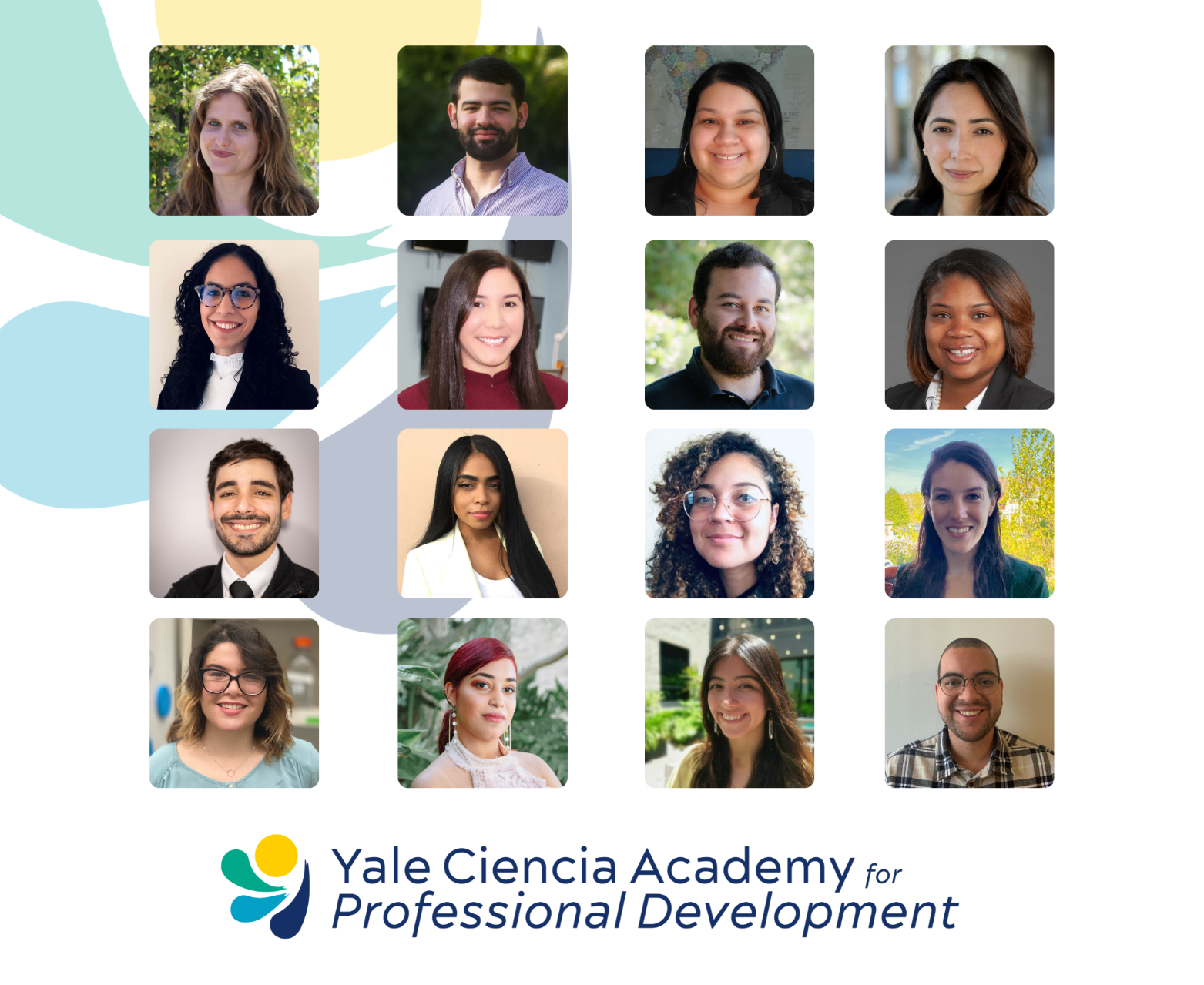This June, 16 young science leaders kicked off their year as fellows of the Yale Ciencia Academy (YCA) for Career Development in a series of online workshops. The competitive program, funded by the National Institutes of Health, prepares promising scientists of color to successfully transition from a PhD into rewarding research careers. Students from 14 universities in the U.S., Canada, and Puerto Rico, selected from 48 applications, are represented in the 2021 cohort of YCA. Meet the full class of 2021 YCA Fellows here.
Led by Yale University in collaboration with the nonprofit organizations Ciencia Puerto Rico (CienciaPR) and iBiology, YCA equips biomedical and health sciences doctoral students from underrepresented backgrounds in the final 1-2 years of their programs with the knowledge, skills, and networks they need to find postdoctoral positions that will further their academic interests and career goals. The program leverages the CienciaPR community — one of the largest networks of Hispanic/Latinx scientists in the world — and a diverse cadre of scientists of color and experts on professional development, mentoring, and diversity and inclusion.
During the initial workshops, fellows developed trust and built community through improv games led by theater expert Boyd Branch. They also learned how to craft an effective personal narrative to communicate their scientific and personal identities to a variety of audiences with the guidance of science communicator and trainer, Liz Neeley. Over the upcoming year, fellows will gather for online conversations and workshops with role models and experts who will help them with career planning, mentoring, and scientific and interpersonal communication skills. Although all activities are designed to help fellows successfully transition to a postdoc matching their career goals, interests, and values, the skills developed through YCA will serve them at every stage of their scientific careers.
One of the most innovative aspects of the program is designing and implementing a science outreach project that allows YCA fellows to practice transferable skills (e.g., science communication, leadership, etc.) and to connect with a community they care about. This year, YCA will also launch its first “Advisor Academy,” a learning community comprised of YCA mentors who will explore ways for research advisors to enhance their mentoring and institutional impact.
To close the program in June 2022, public health circumstances permitting, the cohort will meet in person on the Yale campus for final workshops and to welcome the next cohort of YCA Fellows.
“The Yale Ciencia Academy complements traditional graduate training with access to a diverse network of peers, role models, and advisors,” said Dr. Giovanna Guerrero-Medina, Principal Investigator and Director of YCA. “The goal is to help students gain clarity in their academic and professional goals and become the scientists they want to be. We are excited about the talent and promise among this new class of YCA fellows.”
Started in 2016 and funded by the National Institutes of Health, YCA was originally geared towards graduate students in any stage of their studies and offered more generalized training to support the trainees through academic and professional milestones and expose them to a range of careers. In this format, YCA trained five cohorts for a total of 194 young scientists from nearly 80 institutions across the United States and Puerto Rico. Data indicated that the program helped students define their career paths, improved their professional development and mentoring practices, and increased their confidence around graduate school and career transitions. The peer community of support and the science outreach project were highly rated among past YCA participants with more than 175 outreach projects completed over the past five years reaching more than 50,000 people.
The YCA program was renewed for funding in 2020, pivoting to focus on preparing later-stage graduate students interested in pursuing postdocs. “The postdoc stands as a career-defining step on the path to securing a research career,” said Dr. Guerrero-Medina. “In this second phase, we are applying the insights and best practices we identified during the first iteration to the challenges of retaining scientists of color in academic and research career paths and preparing them to change the system from the inside.”
About Ciencia Puerto Rico
CienciaPR is a nonprofit organization that connects nearly 15,000 Puerto Rican and Hispanic scientists, students, and educators worldwide through an innovative online platform. By leveraging its community’s collective knowledge, the organization has created thousands of resources to improve science education and help forge the next generation of Hispanic/Latinx STEM leaders.
Additional Resources
- Learn more about the Yale Ciencia Academy
- Check out the Yale Ciencia Academy Blog
- Learn more about Ciencia Puerto Rico
CienciaPR on Social Media
The goal is to help students gain clarity in their academic and professional goals and become the scientists they want to be.
Dr. Giovanna Guerrero-Medina, Principal Investigator and Director of YCA
Facebook: www.fb.com/cienciapr
Twitter: www.twitter.com/cienciapr
YouTube: www.youtube.com/cienciaboricua
Follow the Yale Ciencia Academy on social media using: #YaleCienciaAcademy
